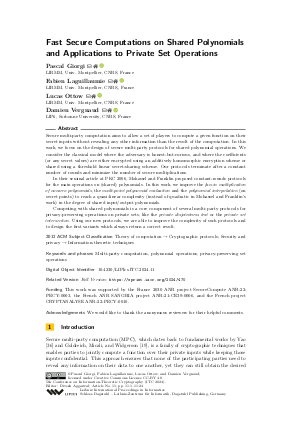LIPIcs.ITC.2024.11.pdf
- Filesize: 0.89 MB
- 24 pages

 Creative Commons Attribution 4.0 International license
Creative Commons Attribution 4.0 International license

Secure multi-party computation aims to allow a set of players to compute a given function on their secret inputs without revealing any other information than the result of the computation. In this work, we focus on the design of secure multi-party protocols for shared polynomial operations. We consider the classical model where the adversary is honest-but-curious, and where the coefficients (or any secret values) are either encrypted using an additively homomorphic encryption scheme or shared using a threshold linear secret-sharing scheme. Our protocols terminate after a constant number of rounds and minimize the number of secure multiplications. In their seminal article at PKC 2006, Mohassel and Franklin proposed constant-rounds protocols for the main operations on (shared) polynomials. In this work, we improve the fan-in multiplication of nonzero polynomials, the multi-point polynomial evaluation and the polynomial interpolation (on secret points) to reach a quasi-linear complexity (instead of quadratic in Mohassel and Franklin’s work) in the degree of shared input/output polynomials. Computing with shared polynomials is a core component of several multi-party protocols for privacy-preserving operations on private sets, like the private disjointness test or the private set intersection. Using our new protocols, we are able to improve the complexity of such protocols and to design the first variants which always return a correct result.




Feedback for Dagstuhl Publishing